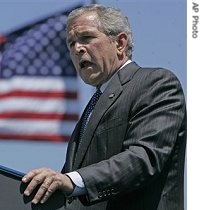2007年VOA标准英语-Bush Prevails in Political Showdown Over Iraq(在线收听)
Washington
25 May 2007
President Bush prevailed in his first showdown with the Democratic-controlled Congress over funding for the Iraq war. But as VOA National correspondent Jim Malone reports, Democrats and a large number of congressional Republicans believe the pressure to change course in Iraq will only grow in the months ahead.
 |
| Geroge Bush, 23 May 2007 |
[The president signed the bill into law Friday.]
"Failure in Iraq affects the security of this country and it is hard for some Americans to see that, I fully understand it," he said. "I see it clearly."
While the president may see the congressional funding vote as vindication of his strategy in Iraq, Democrats clearly have a different idea, even though they acknowledge they suffered a setback in their efforts to force a change in course on Iraq.
Democratic Congressman Rahm Emanuel of Illinois says his party will keep the pressure on the president for the next several months.
"The American people want a new direction to our Iraq policy that focuses on fighting terrorism and not policing a thousand-year civil war between Shia and Sunni," he said. "This summer will be very important here in Washington as Republicans will be consistently asked to take a vote on bringing an end to the current course in Iraq."
Mr. Bush relied on support from congressional Republicans to block Democratic attempts to set a timetable for the withdrawal of U.S. troops from Iraq.
But some senior Republican leaders are already cautioning that their patience is not without limits when it comes to the situation in Iraq.
Mitch McConnell of Kentucky is the Senate Republican leader. McConnell says a military assessment of the situation in Iraq expected in September will be crucial.
"I think the handwriting is on the wall that we are going in a different direction in the fall, and I expect the president to lead it," he said. "He himself has certainly indicated he is not happy with where we are and I think we are looking for a new direction in the fall."
Analysts say the Democrats suffered a political setback on this first skirmish over funding the Iraq war. But Tom DeFrank of the New York Daily News predicts it will not be the last confrontation.
"So I think the Democrats basically decided this was the best they could get right now and I think it was interesting that the president was very careful and prudent, I think, not to gloat, because I think this is a short term victory, but it is a battle that has just begun to be engaged," he said on VOA's Issues in the News program.
Anti-war activists within the Democratic Party are disappointed with the outcome of the funding bill and vow to keep the pressure on congressional Democrats in the months ahead.
But Newsweek magazine White House Bureau Chief Richard Wolffe says the president and his Republican allies successfully exploited divisions within the Democratic Party on the issue of a troop withdrawal deadline.
"People are very dissatisfied with the war across the board," he said. "They also want Congress to shape the direction of the war. But when it comes down to it, people, even Democrats, polls show that 50 percent of Democrats are not happy with cutting off funds for the troops."
The latest CBS News/New York Times poll found 76 percent of those asked believe the war in Iraq is going badly, up ten points from last month.
Jeffrey McCausland is a military expert at the U.S. Army War College in Pennsylvania. He says declining domestic support for the war will complicate the president's troop surge strategy in Iraq.
"Our adversaries fully understand problems that we have got with support for the war back home and elsewhere, and as a consequence, they may step up their efforts to try to do spectacular things that will further discourage the American public," he said.
The domestic debate over the war is expected to reach another milestone in September when U.S. military officials give their assessment of progress in Iraq.
Analyst Tom DeFrank says among those paying close attention will be congressional Republicans worried about their own political re-election prospects in 2008.
"Republican senators have said we are tired of hearing, give us another six months," he said. "This is the last one. So, I think we are half way through the last six month period that President Bush will get the benefit of the doubt politically on Iraq."
The 2008 presidential campaign also remains closely intertwined with the Iraq debate. Democratic Senators and presidential contenders Hillary Clinton and Barack Obama both voted against the funding bill. Obama said the bill amounts to a blank check for the president to continue down what he called a disastrous path.
Republican Senator and presidential candidate John McCain supported the bill and criticized Clinton and Obama for embracing what he called the politics of surrender.